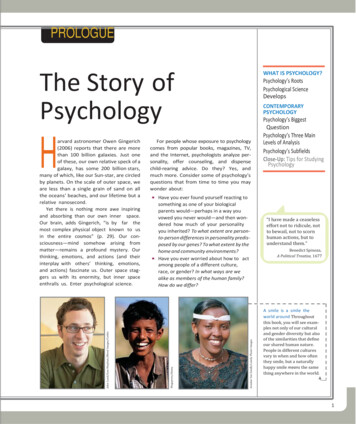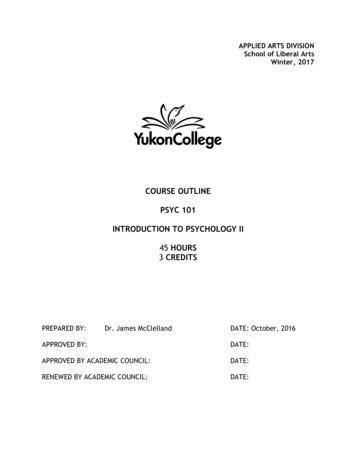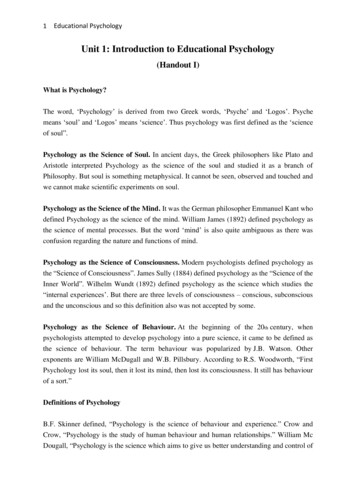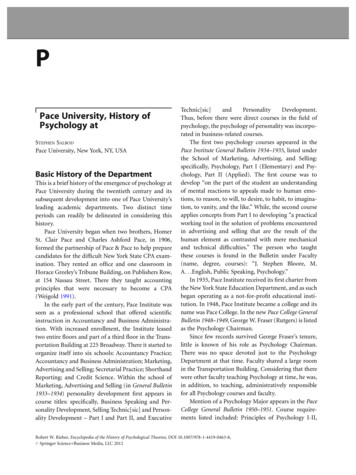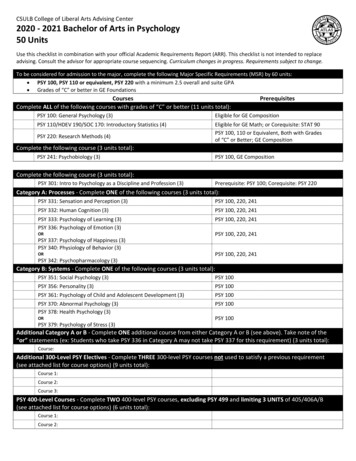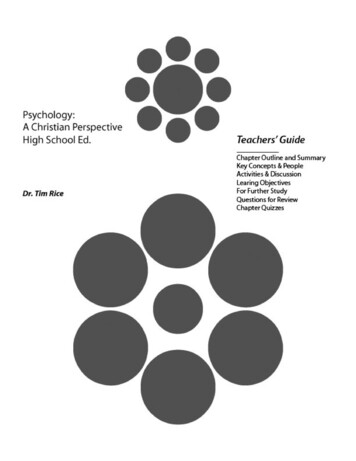
Transcription
Psychology: A Christian Perspective.High School Edition.Teachers’ Guide and Student Workbookby Dr. Tim(Timothy S. Rice, D. Min., LPC)Published byRocking R Ventures, Inc.104 Goss StreetEpworth, GA omCopyright 2011 Timothy S. Rice. License is hereby granted to owners ofthe accompanying text, Psychology: A Christian Perspective, High SchoolEdition, to reproduce this Teachers’ Guide and Student Workbook forindividual and classroom use only.Please join the online community of Christians teaching and studying psychology on Facebook or the Psychology:A Christian Perspective group d-Psychology-A-ChristianPerpective/44136961566 and ian-perspective-high-school.
IntroductionIt is right and proper for Christian students to study the wonders of the mind, the brain, and human behavior. It iscrucial, however, that we approach the study of psychology from a Christian worldview perspective. It is crucial thatChristian students are equipped to recognize and evaluate the worldview assumptions underlying modern psychology’stheories, its schools-of-thought, and its presentation in academia and the culture.It is crucial that Christian students recognize the worldview assumptions underlying modern psychology’s theoriesand schools-of-thought. Our approach is one of guiding students to recognize psychology-specific worldview issuesand to introduce them to the study of the wonders of God’s greatest creation; the human mind.Psychology should be fun and interesting for students. Psychology should be interesting and fun for teachers, too, ifwe approach it from a Christian perspective. If we do not approach it with our worldview lenses in focus, psychologyclass can be dangerous.Christians studying and teaching psychology have to work a little harder than everyone else. In this class, studentsmust think about psychology’s content in the context of their Christian worldview. Teachers must make complexabstract concepts understandable and meaningful. In this class you must think like a Christian about psychology’sconcepts, and more importantly, its underlying worldview assumptions. In this class you and your students need toprayerfully consider deep thoughts. Both Psychology and the Christian worldview are complex topics. Your job is tostruggle with how they relate to one another (if they relate at all). This instructor’s guide and online support wascreated to help ease that struggle for both student and teacher.This is a survey course. As a survey course, we address the main topics generally covered in introductory psychologyclasses, but we do not delve very deeply into any one topic. This course is not special because of its insight into theChristian worldview, and there are many texts that do a good job presenting psychology’s content. This course isspecial because it asks you to consider psychology vis a’ vis a Christain worldview.In a course in which you learn lots of little bits and pieces, there’s a risk of losing sight of the whole. We are wholepersons, more than genetics plus development plus personality plus, plus, plus. Because we are made in the image ofGod, we are more than the sum of our parts. Let’s not forget that. We are more than the sum of our parts.In addition to this teacher’s guide, you have access to our online support which includes a discussiongroup with teachers just like you. Your questions, ideas, teaching methods all of your teachingtips and suggestions will be available to our community of Christian educators. Look for it stian-perspective-high-school and on Facebook atHomeschool Psych and Psychology: A Christian Perpective.This teacher guide/student workbook is intended for use by parents, classroom teachers, or by independent studystudents. It is divided into 15 chapters that correspond to the chapters in Psychology: A Christian Perspective,High School Edition. Each chapter contains:··········Chapter outlineChapter summaryLearning objectivesKey concepts & peopleActivities & discussionFor further studyQuestions for reviewChapter quizAnswers to review questionsAnswers to chapter quiz
As you prepare to teach this course, we’d like to offer a few thoughts on how the author intended this text to be used.CRITICAL THINKING AND REFLECTIVE THINKING: Most importantly, this course was designed to teachyour students to think. Throughout the course teachers and students should practice critical thinking skills. Uponintroduction to new information, we need to ask ourselves the following questions:· What is the claim?· What are you being asked to believe?· What does the Bible have to say?· What worldview assumptions underlie the claim?· What is the evidence?· Are there alternative ways of interpreting the evidence?· What additional evidence would be helpful in evaluating the claim?· What conclusions are most reasonable?By introducing these reflective questions, we are giving the students the tools they need to assess information as itcomes to them through college professors, the media, or even well-intentioned friends.Some of our favorite ways to encourage reflective and critical thinking:· Holding debates with other classmates in a semi-formal environment· Creating stories, scenarios, or vignettes that require the students to take a perspective other than their own, (i.e.explain things from a Freudian, humanistic, evolutionary, etc. perspective.)· Posing questions in several different ways to reach different kinds of learners. It is important that students entercollege with strong writing skills, and the discussion topics and for further study items provide excellentopportunities for students to proactice their writing skills. Creative teaching encourages us to give the studentsdifferent ways to think about their answers. For example, for the discussion question the question, “What doyou think causes mental pain and suffering?” you may ask your students to write their response in their voice,or in the voice of a parent speaking to a child. They may write an article for a local newspaper or for aChristian publication. Some students find it helpful to write letters to key characters, sharing their opinions ofthe characters philosophy. We want the students to use their fluency in communication to answer thesequestions in a way that is meaningful to them.QUIZZES: In some chapters there are dozens of quiz questions. These are meant as a guide, and not intended to beused as a comprehensive exam. Some of these questions can be used in a game show format, and played with the classlike a Jeopardy game. Others can simply be written on the board as questions of the day. You may also consider usingthese as a basis for extra credit points.AP EXAM: This text is intended to be useful for students studying for the AP Psychology exam, but it should not beyour sole source for text preparation. Go to a used bookstore (especially in college towns) and pick up a used AP testguide (I like the Barron’s and Princeton Review versions) and a used copy of a Psychology 101 textbook by David G.Myers. Dr. Myers is a Christian who writes excellent college-level psychology texts. There’s also an on-line dictionaryof psychological terms at http://allpsych.com/dictionary/ and at n the free-response section of the AP Psychology Exam, students are asked to answer two essay questions. Thequestions may require students to interrelate different content areas and to analyze and evaluate psychologicalconstructs and, more generally, theoretical perspectives. Students are expected to use their analytical andorganizational skills to formulate cogent answers in writing their essays. See the College Board’s AP PsychologyCourse Description for more information. Also see the Easy-to-Grade Writing Assignments for AP Psychology.Contact the author with your comments and suggestions at tim@homeschoolpsych.com
Chapter 1 What is Psychology?1.0Chapter 1 OutlineWhat is psychology?Psychology’s influence.A Christian approach to PsychologyPsychology’s GoalsPsychology’s Fields of StudyPsychology’s Approaches1.1Chapter 1 Overview and SummaryIt is important to begin the study of psychology by establishing the basics. Chapters 1 – 3 are about the basics.In this class, like every other introduction to psychology, you will learn about psychology’s history, theories, andmethods. Every introductory psychology class teaches the basics of the brain, learning, development, memory,and so on. But in this class you will consider the worldview assumptions embedded in those topics and theories.In this class you will also compare and contrast modern psychology’s worldview assumptions with a Christianworldview.We prepare to do that by:······Defining and describing what the word psychology means.Understanding psychology’s influence in academia, the culture, and the Christian Church.Describing a Christian approach to the study of psychology.Defining Psychology’s goals.Describing psychology’s subfields.Describing modern psychology’s major approaches or schools of thought.Psychology is one of the most controversial and divisive academic subjects among Christians today. ManyChristians think that psychology is harmless and has a place alongside biology, chemistry, and physics in highschool studies. Many Christians claim that psychology is a dangerous, idolatrous, and ungodly rival religion. IfChrist is Lord of all, He is Lord of theology, education, biology, and psychology.Psychology is the scientific study of human affect, behavior, and cognition. Its theories influence the culture,academia, and the Church. Christians studying and working in psychology must be faithful to Scripture, notcompromise their Christian worldview assumptions, and must understand modern psychology’s history,worldview assumptions, and methods.Evolution, atheism, and humanism are common threads in psychology, but they do not define the discipline.Christians need not fear or avoid the entire discipline. We must, as we do with biology and other academicdisciplines, recognize and respond to anti-Christian assumptions and claiming psychology for Christ.The main purposes for psychological research include:····Observing and describing psychological phenomena.Creating and testing hypotheses to explain the observations.Discovering the factors that influence mental processes.Developing techniques to predict, improve, or otherwise change behavior, thoughts, learning, andemotions.
When psychologists focus on a particular aspect of study or practice, they enter one of psychology’s subfields.········Cognitive psychologists study mental processes.Physiological psychologists (also called neuroscientists) study the brain and nervous system.Personality psychologists study the unique characteristics of people.Developmental psychologists study changes in behavior and mental processes across the life span.Counseling psychologists study the causes of and the cures for mental and behavioral disorders.Educational psychologists study teaching and learning.School psychologists test and diagnose learning and academic problems.Social psychologists study the ways people interact with other people and in groups.There are five main approaches to psychology also known as “schools.” Each makes worldview assumptionsabout the nature of Mankind.·····1.2The biological approach emphasizes biological structures and electro-chemical processes.The behavioral approach emphasizes the relationship between environmental influences and behavior.The cognitive approach emphasizes thought processes.The psycho-analytic approach emphasizes unconscious processes.The humanistic approach emphasizes the belief in Mankind’s innate goodness and potential.Chapter 1 Learning ObjectivesStudents will be able to:··········1.3Define and explain what the word “psychology” means.Discuss the importance of worldviews in defining psychology and describe how psychology’s definitionhas changed.Describe the controversy among Christians about psychology.Describe psychology’s influence in academia, the culture, and the Christian Church.Describe a Christian approach to the study of psychology.Describe psychology’s goals.Describe psychology’s subfields and careers.Describe modern psychology’s major approaches or schools of thought.Identify possible career alternatives in psychology.Describe areas of potential psychological research on topics of interest to Christians.Chapter 1 Key Concepts & PeopleABCs (Affect, Behavior, opular eterminismEmpiricism
Chapter 1 Activities & Discussion1.4121.51Christian high school students beginning an introductory psychology course probably bring with them verydifferent presuppositions about psychology. At the beginning of class, pass out index cards and ask to completethe sentence “Psychology is .” Repeat this exercise at the end of the course to see how their answerschanged. The video High School Psychology Commercial is a cute introduction to the question “what ispsychology?”What does the word “psychology” mean to you?Why is psychology controversial among Christians today?What is the reputation of psychological therapy and psychological science in your church?How does the duty to love God with one’s mind extend to psychology?What do the terms freedom, determinism, and responsibility mean to you?What does the term cultural commission mean and how does the term apply to psychology?What does it mean to love the Lord your God with all your heart, soul, and mind?Why is it especially important to wear the full armor of God while studying psychology?How could failing to recognize the worldview assumptions embedded in psychology’s theories lead Christianstudents to inadvertently compromise their Christian worldview?What impact do you think Darwin’s theory of evolution had on the study of the human mind?In what ways has psychology influenced the Church?In what ways has psychology influenced modern culture?Why do many Christian students walk away from their faith after the first year of college?Chapter 1 For Further Study10Web: Review the Divisions of the American Psychological Association and visit the homepage for a few of thedivisions to explore the extent of psychological topics.Find word #5590 (psuche) in Strong’s Exhaustive Concordance of the Bible. Review usage of psuche, readverses containing the word, and compare and contrast meanings of psuche.Video: Discovering Psychology is an instructional series on introductory psychology for college and high schoolclassrooms and adult learners comprised of 26 half-hour video programs. The series features demonstrations,classic experiments and simulations, current research, documentary footage, and computer animation andprovides students plenty of opportunity to discern the worldview perspectives embedded in Dr. Zimbardo’snarration.Read: Christ, the Lord of Psychology, by Eric L. Johnson in the Journal of Psychology and Theology.Read: Select articles from the Neuroscience & Christianity page of the American Scientific Affiliation wherethere are a number of resources for further study on the Psychology.Read: The End of Christian Psychology by Martin & Deidre Bobgan at Psychoheresy-aware.orgRead : All Truth God’s Truth? by Martin & Deidre Bobgan at Psychoheresy-aware.orgRead: Christian Psychology - Part I by Dave Hunt at the Berean Call. Hunt describes Christian psychology as themost deadly and at the same time the most appealing and popular form of modernism ever to confront thechurch.Read: Christian Psychology - Part II by Dave Hunt at the Berean Call. Hunt describes Christian psychology ascult-like and calls desperately for a return to biblical Christianity.Read: Biola University’s Journal of Psychology & Theology11Read: Psychology and Faith, by David G. Myers23456789
1.6Chapter 1 Questions for Review1234910Define psychology in your own words.Describe reasons that psychology is controversial among Christians today.Explain and provide examples of psychology’s influence in the culture and in the Christian Church.Why does the author of the text say that “psychology is not a harmless academic discipline nor is it inherentlyanti-Christian?”Describe the impact of Darwin’s theory of evolution on the study of the psychology.Name and describe five of psychology subfields.What advice does the text offer about a Christian approach to Psychology?The text named four things psychologists do? Name and describe them.The text named five main approaches to psychology. Name and describe them.Describe three helping careers Christians might pursue and the ways that psychology influences those careers.1.7Chapter 1 Quiz1Name five of psychology subfields.Name the five main approaches to psychology.A Christian approach to psychology recognizes that Mankind is uniquely created .By studying God’s , guided by , psychology should seek understanding of how weare like the animals and how we are unique in our God-likeness.5678234
1.8Chapter 1 Questions for Review (Answers)1The scientific study of the brain and behavior. The science of human affect, behavior, and cognition.The study of the soul, the mind, and the relationship of mind to the brain and the body.Some Christians see psychology as a harmless academic discipline and other Christians believe thatpsychology (especially counseling psychology) represents a secular, humanistic, and idolatrousreplacement for Biblical anthropology and Biblical models of caring for problems of living.Psychological theories influence sermons across the country. Some pastors leave the pulpit for jobsin pastoral counseling or social work. Christian authors and speakers sometimes take popular secularself-help books, theories, and speaker and “Christianize” them by mentioning the Bible and Jesus.Modern psychology’s worldview assumptions are not harmless, but they do not define or limitpsychology.Beginning with Charles Darwin’s Origin of Species psychology, underwent a transformation. Datawas interpreted in ways that excluded supernatural beliefs and assumptions. Psychology, once thestudy of the soul, became the study of the brain and behavior Darwinian macro-evolution is nowimposing itself on the Christian understanding of Man (psychology) and trying to exclude anythingChristian.Cognitive psychologists study mental processes.Physiological psychologists study the brain, how nerve cells communicate and transmit information, and therole of genetics in mental disorders.Personality psychologists study the unique characteristics of people.Developmental psychologists study changes in behavior and mental processes across the life span.Counseling, clinical, and community psychologists study the causes of mental and behavioral disorders anddevise techniques to help people recover from those problems.Educational psychologists study teaching and learning and develop strategies to improve teaching andlearning.School psychologists testing for, diagnose, and treat learning and academic problems.Social psychologists study the way that people interact with other people and in groups.234567Christians studying psychology must;Respect the inspiration and authority of the Bible.Not underestimate the distorting, and destructive influence of sin on human thinking.Remember that there will be no conflict between true psychology and a Christian worldview.Not compromise their Christian worldview assumptionsMust understand modern psychology’s history, philosophical assumptions, and empirical methods8Psychologists observe and describe psychological phenomena.Psychologist test theories and hypotheses explaining the phenomena.Psychologists attempt to identify the factors that influence our thoughts, feelings, and behaviors.Psychologist develop and implement techniques to predict and change thoughts, feelings, behavior.9The biological approach views mental processes and behaviors in terms of biological structures andelectro-chemical processes.The behavioral approach emphasizes the relationship between environmental influences andbehavior.The cognitive approach emphasizes conscious thought processes. Cognition refers to perception,problem solving, memory, thinking, and any mental process that transforms sensory input.The psychoanalytic approach emphasizes unconscious processes.The humanistic approach emphasizes the influence of our thoughts, feelings, and experiences on theenvironment and emphasizes innate goodness and potential.10Your discretion.
Chapter 1 Quiz (Answers)1Cognitive psychologistsPhysiological psychologistsPersonality psychologistsDevelopmental psychologistsCounseling, clinical, and community psychologistsEducational psychologistsSchool psychologists2The biological approach views mental processes and behaviors in terms of biological structuresand electro-chemical processes.The behavioral approach emphasizes the relationship between environmental influences andbehavior.The cognitive approach emphasizes conscious thought processes. Cognition refers toperception, problem solving, memory, thinking, and any mental process that transforms sensoryinput.The psychoanalytic approach emphasizes unconscious processes.The humanistic approach emphasizes the influence of our thoughts, feelings, and experienceson the environment and emphasizes innate goodness and potential.3A Christian approach to psychology recognizes that Mankind is uniquely created in the image of God.4By studying God’s natural revelation, guided by special revelation, psychology should seekunderstanding of how we are like the animals and how we are unique in our God-likeness.
Chapter 2 A Christian WorldviewChapter 2 OutlineWhat is a WorldviewWhat is a Christian Worldview?What Do You Believe About God?What is the Nature of Mankind?How Can We Know Things With Certainty?Are There Moral Absolutes?What Are the Causes and Cures for Mental Pain and Suffering?2.1Chapter 2 SummaryEveryone has core beliefs and assumptions – a worldview. All psychological research and theorizing happen in aworldview context. Ultimately, truth is only discernible from error at the worldview level. The Christian worldviewbegins with the biblical account of God, creation, the fall, and redemption. A Christian worldview and modernpsychology intersect around five questions.·····2.2What Do You Believe About God?What is the nature of Man?How can we know things with certainty?Are there moral absolutes?What are the causes of and the cures for abnormal thoughts, feelings, and behaviors?Chapter 2 Learning Objectives.Students will be able to:··················Define “worldview.”Explain their worldview and explain how it intersects with modern psychology along the fiveworldview issues.Describe a Christian view of God and the nature of Mankind.Define and describe epistemology from a Christian perspective.Describe a Christian view of moral absolutes.Describe a Christian perspective of the causes for mental pain and suffering.Describe the history and influence of naturalism on psychology and other sciences.Describe the limitations of naturalistic descriptions of Mankind.Describe the history and influence of Darwinian evolution on psychology.Name several of the fathers of modern psychology who were atheists.Define Biblical anthropology.Define epistemology. Describe a Christian view of knowledge.Describe the “faith/Science dichotomy” and discuss a Christian view of science.Describe the phrase “All Truth is God’s Truth” as it relates to a Christian worldview.Describe general and natural revelation in relation to knowledge about the nature of Man.Describe empiricism and its limits.Describe the effect of sin on the study of psychology.Describe the role of sin in a Christian understanding of mental pain and suffering. Compare aChristian view of sin with moral relativism and humanism.
2.3Chapter 2 Key Concepts & ith/science dichotomy2.4God-likenessNaturalismPopular PsychologyFreedom vs. DeterminismHeridity vs. EnvironmentThe SelfCultural CommissionChapter 2 Activities &DiscussionHow does psychology “fit” in your worldview?Is psychology a dangerous rival religion?What other core beliefs are parts of your Christian worldview (i.e. the family, sexuality, dancing)?It this statement true or false? Support your answer. “The foundational beliefs of a Christian worldview, ofan atheist’s worldview, and of a psychology professor’s worldview are matters of faith and philosophy andnot of data and science.”Do we have a mind that is greater than the sum of our brain activity?Why do Christians disagree about whether extra-biblical techniques are proper approaches to caring formental suffering?How does God use guilt, pain, and suffering as tools to conform Christians to Christ’s image?In what ways are we like the animals physically?In what ways are we like animals mentally?In what ways are we different from the animals?Describe a monistic, dualistic, and tripartite perspective on human nature. Differentiate between naturalisticmonism and Christian monism.What do you believe about God?What do you believe about the nature of Mankind? Are we products of nature or nurture? Is humanbehavior determined, or are we free to make willful choices? Are people basically good or bad?What do you believe about moral absolutes?What do you think causes mental pain and suffering?Is “all truth God’s Truth?”Why do many people believe that a Christian worldview and science are inherently in conflict?How does Biblical theism provides the foundation of science (and therefore of psychology)?Using Romans 1:25 as your guide, respond to this statement; “Christians should reject any use of naturalscience methods to understand Mankind.”Pelagianism is a theological doctrine proposed by Pelagius, a British monk, and condemned as heresy by theRoman Catholic Church in A.D. 416. It denied original sin and affirmed the ability of humans to berighteous by the exercise of free will. Compare and contrast Humanism with Pelagianism then contrast eachwith the Biblical concepts of justification and sanctification.2.5Chapter 2 For Further Study1Read: The Spheres of Revelation and Science. What Are Their Limitations in Relation to Each Other? Clark,R. E. (1953). Journal of the American Scientific AffiliationWeb: Historical Studies of Science and ChristianityRead: How Sin Affects Scholarship: A New Model by Stephen K. MoroneyWeb: Summit MinistriesWeb: What's a Christian Worldview? by Del Tackett, Focus on the Family2345
2.6Chapter 2 Questions for Review1What is a worldview?2What is epistemology?3What is natural revelation? What is special revelation?4What do you believe about God?5What do you believe about the nature of Mankind?6What do you believe about moral absolutes?7What do you think causes mental pain and suffering?8Describe a monistic, dualistic, and tripartite view of human nature.9Describe the faith/science dichotomy. Do you believe there is a dichotomy between science and a Christianworldview? Explain your answer.10Have your thoughts and opinions about psychology and worldviews changed?
2.7Chapter 2 Quiz1.Complicated mental processes like “thoughts” and “feelings” involve complex interactions between the ,, , and .2.One’s worldview is a complex system of core , , and .3.Psychologists don’t often use the word “worldview,” but they do define a as a mental structure used toorganize and understand the world around us.4.The Christian worldview begins with the Biblical account of , , , and .5.Our personal bias and depravity should cause us to maintain a and hold our conclusions .6.Christians studying psychology must be willing to and be willing to .7.A Christian worldview recognizes moral absolutes described and by Jesus Christ.8.A Christian worldview emphasizes as the primary (if not exclusive) cause of mental and emotional pain9.Your worldview of the causes of and cures for mental suffering includes whether you believe that , ,and and guilt have meaning and purpose or are unfortunate circumstances to be avoided at all costs.10.A Christian view of the nature of Mankind is also called .11.According to a Christian worldview, God reveals Himself in , , and supremely in His Son.12.The historical Christian approach to science was that faith and science were .13.The fathers of modern science (many of whom were Christians) saw science as one tool to , , and to .14.A Christian worldview believes that God reveals things to us in two ways: revelation and revelation.15.God’s natural and special revelations are parts of an and whole.
Chapter 3 Psychology’s History and Worldview3Chapter 3 OutlineWhat Does it Mean to be Human?New Ways of Knowing.Psychology as a Science.Atheism, Naturalism, and Evolution.What is Man? Neurobiology.What is Man? Behavioral Genetics.What is Man? Behaviorism.What is Man? Sigmund Freud.What is Man? Cognitive Psychology.What is Man? Humanism.What is Man? The Self and Positive Psychology.What is Man? Mental Pain and Suffering.What is Man? Morality.What is Man? Feminist Psychology.3.1Chapter 3 SummaryPsychology is old and psychology is new. Poets, theologians, and philosophers throughout history have thought deeplyabout the mind, the soul, and the nervous system. Most histories date the beginning of modern scientific psychology atin 1879 with Wilhelm Wundt’s psychological laboratory in Germany.The fathers of modern psychology propo
It is important to begin the study of psychology by establishing the basics. Chapters 1 – 3 are about the basics. In this class, like every other introduction to psychology, you will learn about psychology’s history, theories, and methods. Every introductory psychology class teache


